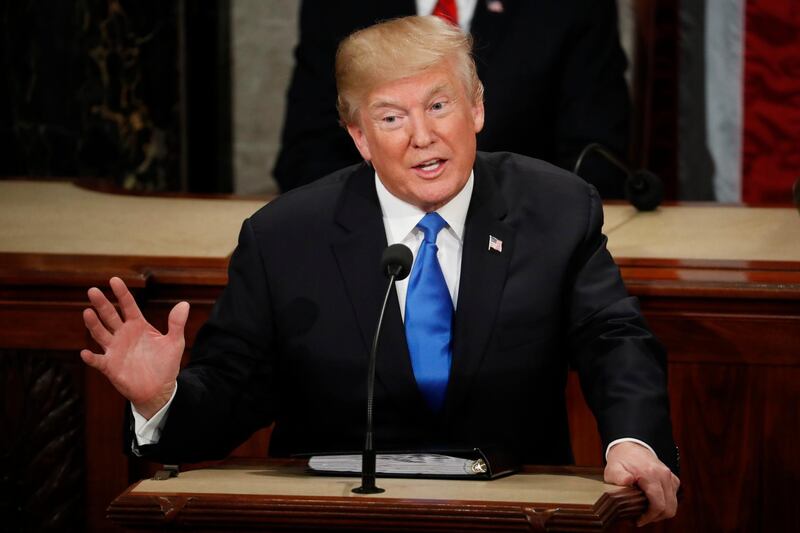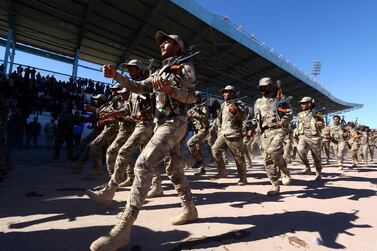Updated:This story has been amended to reflect that President Donald Trump will now attend and address the meeting following a State Department announcement on Tuesday.
The anti-ISIS Coalition is gathering in Washington on Wednesday for its first meeting since last summer, aiming to stave off any ISIS resurgence following the territorial defeat of the group.
The meeting of the 79 member states will start on Wednesday with a discussion on Syria and Iraq, before remarks by US Secretary of State Mike Pompeo.
Mr Pompeo will also chair a meeting for the Small Group of the Global Coalition. Its members besides the US are France, Germany, the United Kingdom, Egypt and Jordan.
Saudi Minister of State for Foreign Affairs Adel Al Jubeir is expected to represent Riyadh in the meetings and his Turkish counterpart Mevlut Cavusoglu has confirmed his attendance, even as talks over a Turkish safe zone in Syria appear to have hit a snag. National security advisers and defence ministers from other regional countries will attend.
US officials on Monday said the summit will focus on four themes: recognising the liberation of territory and ensuring permanent defeat, supporting the Iraqi government, renewing the coalition's commitment, and holding ISIS members accountable. However, the declared US withdrawal of troops from the area is casting a shadow over proceedings before they begin, raising questions in the administration over risks of ISIS resurgence.
"ISIS is regenerating key functions and capabilities more quickly in Iraq than in Syria, but absent sustained pressure, ISIS could likely re-surge in Syria within six to twelve months and regain limited territory” a report by the Pentagon released this week said. The terrorist group “may conduct opportunistic attacks on US personnel as they withdraw but will leverage the event as a 'victory' in its media”, the US defence officials warned.
ISIS remains a "potent force of battle-hardened and well-disciplined fighters that could likely re-surge in Syria absent continued counter-terrorism pressure”, the report said.
The ministerial meet-up has been in the planning since last September, before US President Donald Trump declared his intention to withdraw from Syria on December 19, one official said. "We will discuss the next phase of the campaign in Iraq and Syria, which will focus on protecting against a resurgence of ISIS through stabilisation and security assistance".
One US official insisted that the goals in Syria remain unchanged despite Mr Trump's plan to pull out at least 2,000 US troops. "One of our overarching goals in Syria is the exit of all Iranian commanders from Syria."
Mr Trump’s planned withdrawal pushed his Secretary of Defence James Mattis and his anti-ISIS envoy Brett McGurk to resign in protest.
In an effort to reassure allies about US commitment, Mr Trump said on Sunday that American troops will stay in Iraq. "We're going to keep watching and we're going to keep seeing and if there's trouble, if somebody is looking to do nuclear weapons or other things, we're going to know it before they do," Mr Trump told CBS's Face The Nation. "I want to be able to watch Iran" he said.
But in Syria, US officials say the withdrawal plans are still on track even with no timetable announced. On Monday, the State Department called upon other nations to repatriate hundreds of ISIS foreign fighters in custody by the Syrian Democratic Forces in Syria. "The United States calls upon other nations to repatriate and prosecute their citizens detained by the SDF and commends the continued efforts of the SDF to return these foreign terrorist fighters to their countries of origin" the statement said.
Mr Trump’s withdrawal plan from Syria and Afghanistan (7,000 troops) is also being challenged by Congress as the US Senate passed a non-binding amendment last week that warns against any precipitous pullout from those countries.
Faysal Itani, a fellow with the Atlantic Council who studies Syria, said "there is no argument that ISIS has been defeated if we were to measure success by the square miles it controls." But he warned that looking at ISIS as an insurgency group, sleeper cells or its ability to carry operations, the debate gets more complicated, and the group is far from being completely eradicated.
Mr Itani said one misconception about this US administration “was assuming it spoke with one voice [and that its members all spoke for the US president].”
In that context, the challenge for those gathering in Washington on Wednesday would be “determining who [if anyone] in the administration truly speaks for the president on foreign policy” he said.
Mr Trump is expected to deliver brief remarks at Wednesday’s meeting at the State Department.







